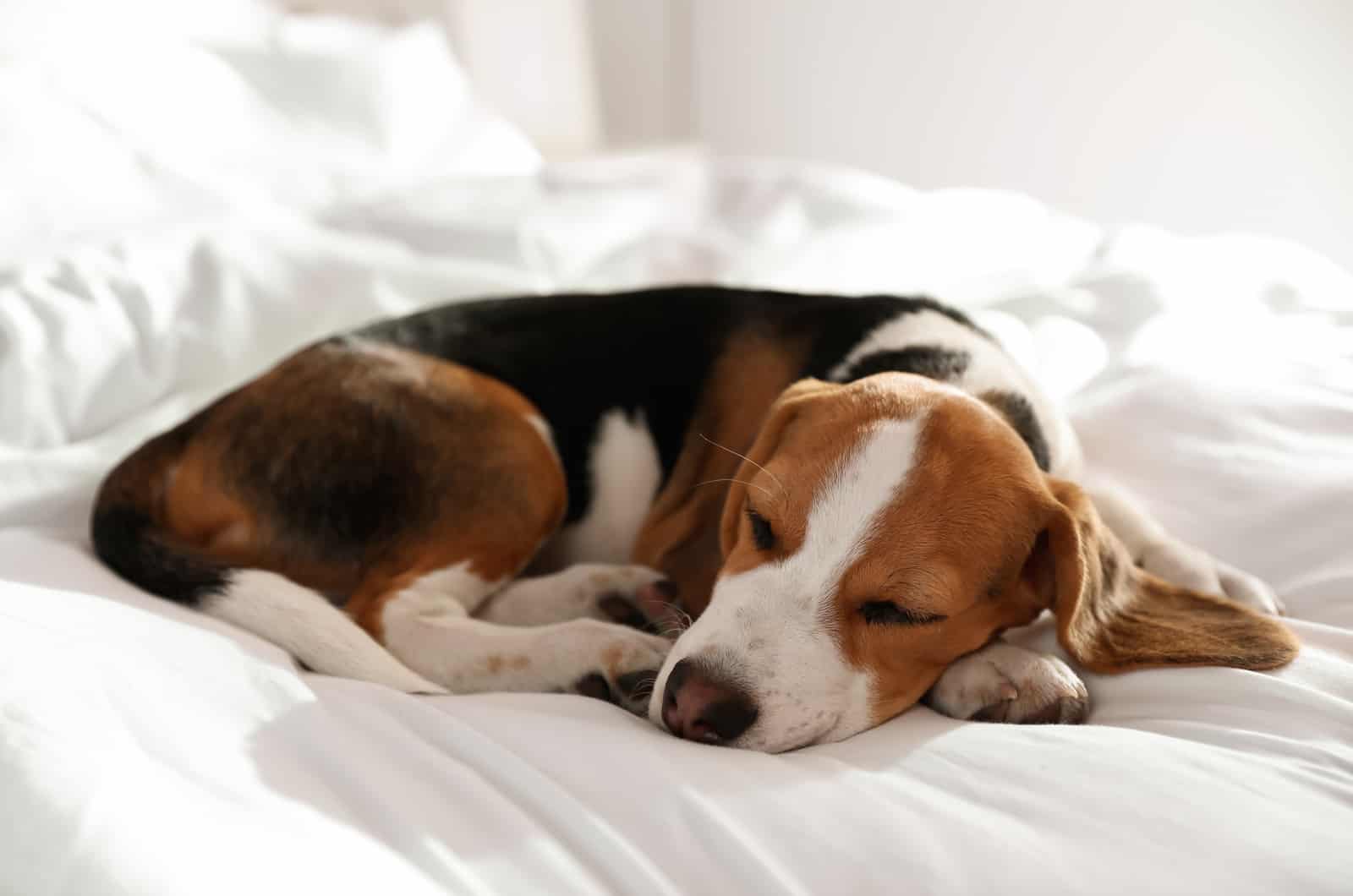A new puppy just became a part of your life. You and your family are very excited about your new member and can’t wait to cuddle and play with your furry friend.
But not everything is pink and simple. You are also troubled by numerous questions, and recently you noticed your 8 week old puppy breathing fast while sleeping.
What is happening? Should you be worried? What could be causing your pooch to breathe faster than usual?
I’m guessing that you immediately started looking for an answer about what the normal breathing frequency of a healthy dog is.
In this article, we explain why this phenomenon occurs. Also, we provide detailed descriptions of the reasons why your dog breathes rapidly while sleeping. In addition, we advise you in which cases it is necessary to contact a veterinarian.
Why Is My 8 Week Old Puppy Breathing Fast While Sleeping?
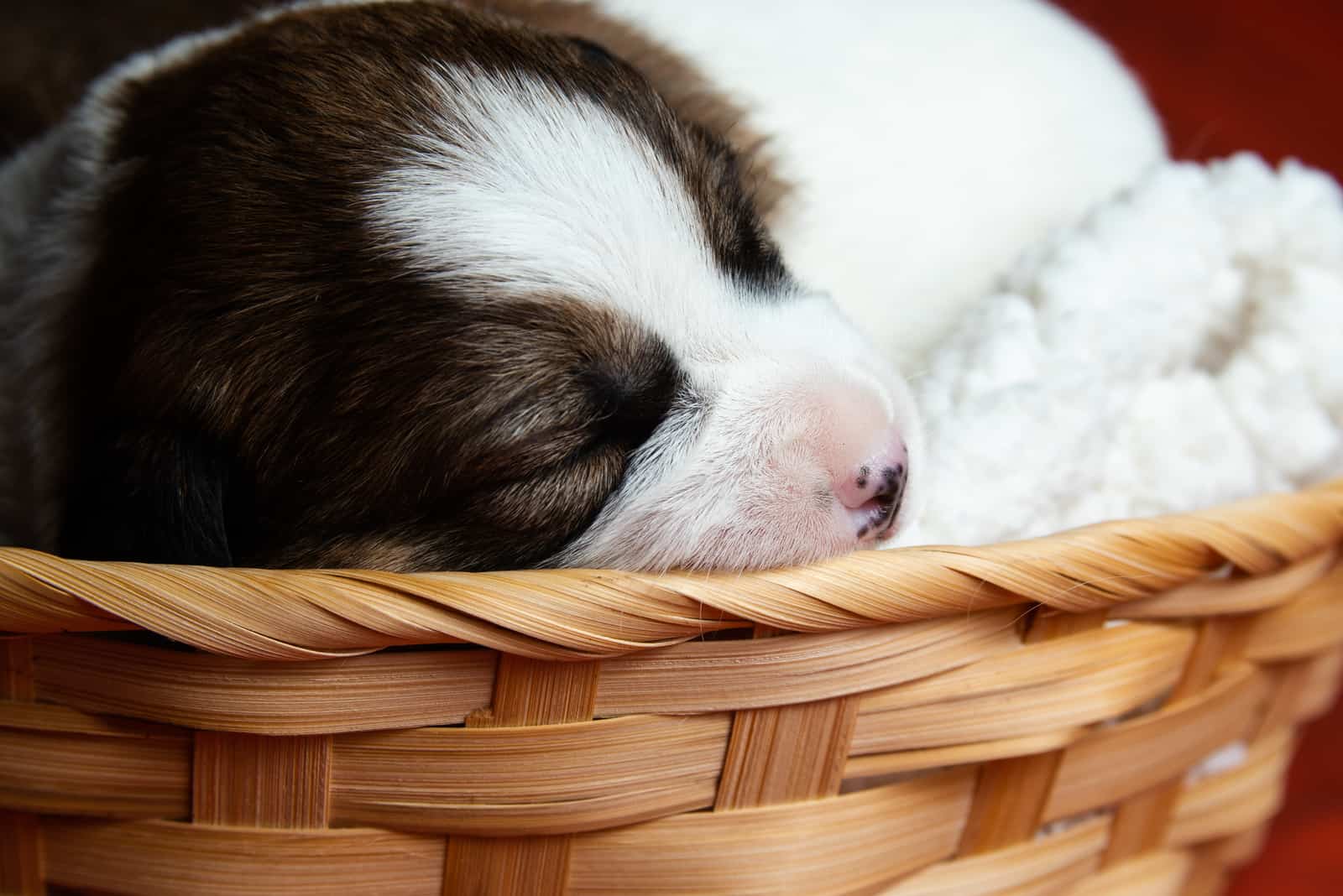
Puppies differ from adult dogs in many ways. From the very beginning, you will have to teach them all the rules of behavior, defecation, and various commands and tricks. Also, not all puppies progress in the same way.
While some will very quickly master where they can and cannot defecate, some will be 6 months old and not potty trained.
If you already had a dog, you may have forgotten what life with a very small dog actually looks like. You noticed your 8 week old puppy breathing fast while sleeping and you immediately got worried.
Right at the beginning, we will tell you that a puppy’s breathing frequency is different from that of an adult dog. As well as young puppies, it is also not unusual to notice an older dog breathing fast.
How Fast Should My Puppy Be Breathing While Sleeping?
The breathing rate of an adult dog is usually between 20 and 34 breaths per minute.
The dog’s breathing should be calm and deep.
Puppy’s breathing rate can be higher – the number of breaths per minute can even go up to 40!
Over time and as the puppy grows, the frequency of its breathing should slowly decrease.
Even if you notice that your puppy is breathing twice as fast as an adult dog, this can still be completely normal. Rapid breathing, also called tachypnea, is not so rare in puppies.
10 Common Causes Of A Puppy Breathing Fast
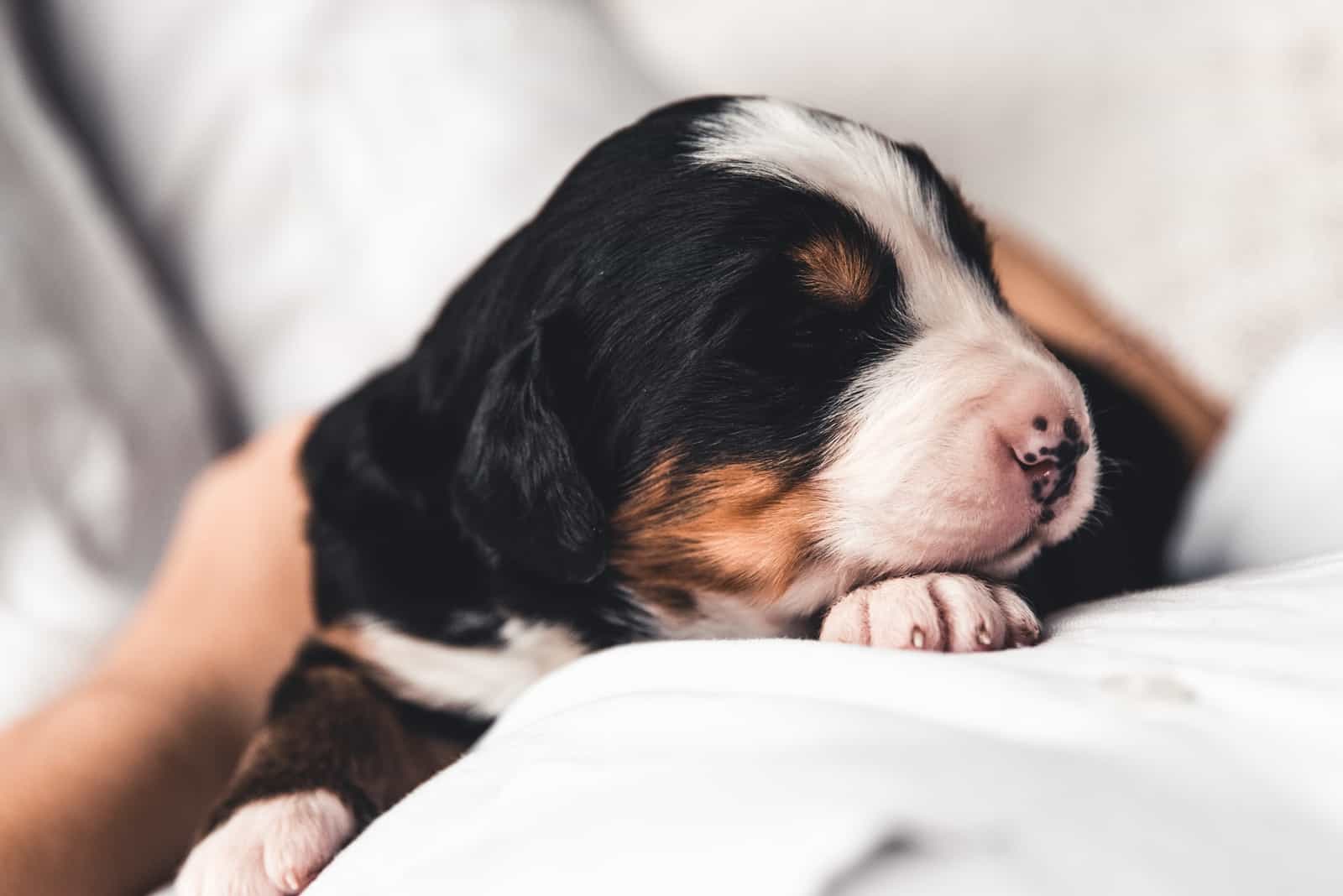
This is the first time you have noticed your 8 week old puppy breathing fast while sleeping. You must be wondering: Why is this happening? Do puppies breathe fast just like that? Or is something serious going on?
There are some common reasons that cause puppies to breathe fast. Let’s take a look at them!
1. Genetic Predisposition Of The Dog Breed
Some dogs breathe faster and heavier than other dogs. This is known as brachycephalic breathing syndrome. The group of brachycephalic dogs includes dogs such as Pugs, French Bulldogs and English Bulldogs, Boxers, Pekingese and Boston Terriers.
These dogs have much shorter noses and narrower windpipes compared to standard dogs. For this reason, their respiratory rate is different.
Also, it is not unusual for a smaller dog to breathe faster than a large dog.
If your dog belongs to one of the brachycephalic breeds, you have no reason to worry about their fast breathing. However, in some cases, this breathing rhythm can damage the dog’s health, so the help of a veterinarian is needed.
2. Rapid Eye Movement (REM Sleep)
Just like humans, puppies also go through different stages of sleep. One of the stages is called REM sleep.
In this stage of sleep, the dog experiences various feelings, and it is very possible that they have dreams, just like humans.
While this sleeping stage lasts, your puppy might be restless and may even move parts of its body or mumble. Also, there is a large possibility that your dog will breathe rapidly during this phase of sleep.
Therefore, this is a completely normal phenomenon and a natural reaction of the dog’s body.
3. The Dog Is In Pain
Why is my puppy breathing fast? Sorry to inform you, but they might be in pain!
If your dog seems to have difficulty breathing, with no apparent reason you can see, it is possible that the dog is in pain. You may not have been paying attention, but there might be some other symptoms present in your dog.
If you notice any other symptoms, such as the dog licking intensely, a dog throwing up white foam, or a higher body temperature, it will be clear that it is an injury or some other cause of pain in your dog.
So, a dog breathing fast while sleeping in combination with some other symptoms could be a sign that your dog is in pain.
4. Excessive Exercise
Exercise is very important for dogs, both physically and mentally. Many of you spend a lot of time away from home, so you need various tricks to keep your dog entertained while you are at work.
Perhaps, for this reason, you have acquired various games that your dog can use to make the time pass faster while you are away. Maybe you have been exercising your dog more intensively in recent days.
Although exercise is desirable and recommended, in some cases it can have a negative effect on the dog.
Maybe your pooch is not yet ready for excessive daily doses of exercise. You probably weren’t even aware that they actually got tired and exhausted. Therefore, changes in your puppy’s breathing while sleeping can be the result of excessive exercise.
5. Anxiety And Stress
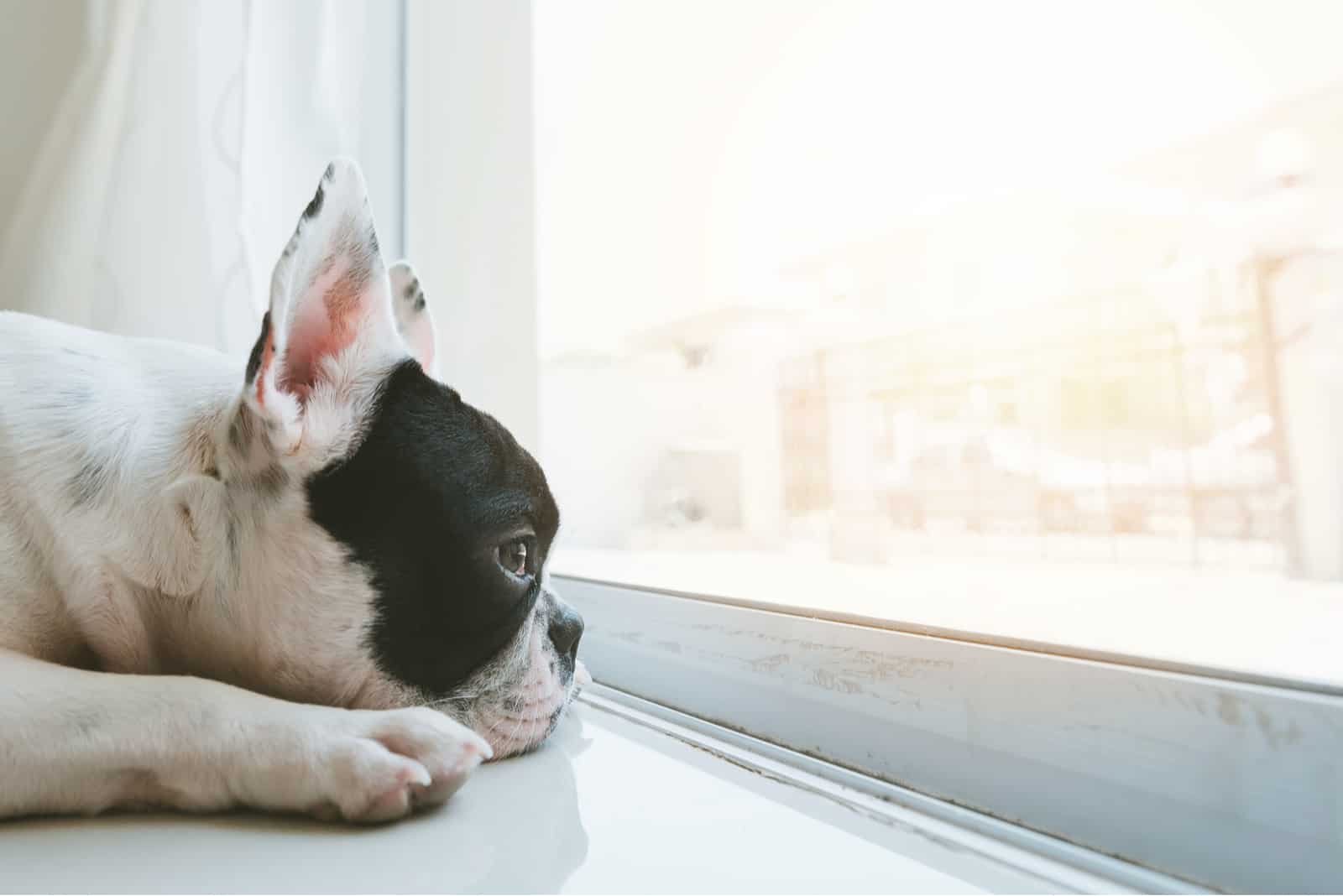
Puppies are very sensitive and many things that you would not even suspect can cause them anxiety and stress. For example, your dog can suddenly become afraid of something inside the house, and this fear can stay for days.
If your puppy has experienced a particular fear or stressor, it can cause the puppy’s breathing rate to increase.
Also, check if your dog has recently started to tremble or barks more than usual.
It is possible that your puppy will return to their normal breathing rate in a few days. If this is not the case, it is necessary to discover the source of the stress and do everything you can to help the puppy get rid of its fear.
6. Poisoning
Although there are certain smells that pooches hate, our furry friends still love to poke their noses wherever they go. Not just sniffing – they love to chew whatever comes their way as well!
This characteristic of theirs can be harmless, but also potentially dangerous. Why? Things your dog chews or licks while walking can contain poisons.
If you notice diarrhea at night in your puppy, loss of appetite, or lethargy with rapid breathing while sleeping, it is possible that your pet has experienced poisoning.
How does poisoning happen? By consuming human food that does not suit your dog, swallowing cleaning products, human medicines, or in various other ways.
Positioning might be very dangerous, so it is necessary to seek the help of a veterinarian.
7. Anemia
A dog’s respiratory system includes its nose, mouth, throat, trachea, and lungs. The oxygen in the dog’s body transfers to red blood cells in the dog’s lungs. Red blood cells are very important since they are the ones that carry oxygen throughout the rest of the dog’s body.
Sometimes, a puppy’s fast breathing shows that the dog is anemic.
Anemia in dogs is a condition caused by a lack of red blood cells or erythrocytes.
In addition to rapid breathing, an anemic dog can also have an increased heart rate.
If the veterinarian determines that your dog is anemic, the appropriate treatment will be prescribed.
8. Kennel Cough
One of the common causes of rapid breathing in a puppy is Kennel Cough.
This is a respiratory disease that dogs can get from other dogs by directly touching them or using food or water bowls from dogs with this disease. This health condition is usually not too serious, but this might not be the case with small puppies since they are so young and fragile.
Besides your puppy’s fast breathing while sleeping and its cough, you might also notice symptoms such as fever, sneezing, and lethargy.
This disease will usually pass after a week or 10 days, but in some cases, antibiotics will be needed.
9. Heart Disease
Heart disease is a serious condition that can be the cause of a puppy’s fast breathing.
If the dog’s heart does not pump blood properly, there will be a lack of oxygen in the dog’s organs. For this reason, your dog breathes rapidly in its struggle to compensate for the lack of oxygen.
Additional symptoms you may notice are the dog quickly tiring, coughing, and a reduced appetite.
Heart disease is a very dangerous condition for a dog, which, if left untreated, can lead to heart failure.
If you notice even the slightest possibility that your dog’s rapid breathing could indicate heart disease, consult your veterinarian immediately.
10. Heatstroke
Another serious medical condition that a puppy’s fast breathing problem might indicate is heatstroke.
Your dog probably loves lying in the sun, but you should know that this is not recommended at all, especially during hot summer days. Dogs can get sunburn but can also get heatstroke.
As a result, rapid breathing while sleeping, intense panting, elevated body temperature and clear agitation or disorientation can occur in the dog.
Be careful not to walk your puppy on hot days, except early in the morning and late at night, when the air temperatures are not too high. Also, never leave your dog alone in a closed car. If you notice your dog panting in the car, they might have heatstroke.
Heatstroke in dogs can cause seizures, brain swelling, and kidney damage. This is a very serious health issue, so do whatever it takes to keep your dog safe from heatstroke.
What Should I Do If My Puppy Is Sleeping And Breathing Too Fast?

We all do some weird stuff while sleeping. Just like people, dogs can have some unusual behaviors while sleeping, such as rolling their eyes back. Some puppies also snore, pretty loudly!
Some owners might also notice dyspnea in their puppies. This is a condition which refers to shortness of breath as a consequence of the puppy’s obstructed airways.
Your puppy breathing fast while sleeping is your current worry.
Is there anything you could do?
First, make sure your puppy’s breathing really is faster than it should be.
We know what a normal breathing rate is for an adult dog, but as we already said, this can be different for puppies.
So, take a minute and count every time your puppy inhales and exhales. If you are now sure that your puppy’s breathing rate is out of normal range, you should look out for other symptoms.
Perhaps your puppy’s breathing will be normal again tomorrow or in a few days’ time. What you can do initially is to make sure your puppy is sleeping in a comfortable place. The room where your puppy stays should be ventilated and should have a moderate air temperature.
Also, make sure that your puppy receives enough physical and mental exercise every day, but don’t overdo it.
Furthermore, always take your puppy out to defecate before they are ready to go to sleep.
And don’t forget – your puppy needs a lot of sleep. Even though it feels like a lot of work right now, we promise you that puppies get easier with time! And it all pays off!
Is My Puppy In Distress?
There is a possibility your puppy is in distress if they are breathing fast while sleeping.
Maybe they are dreaming or – even though it is hard to believe – puppies can also have nightmares. Maybe you just left them home alone for the first time that day and they were stressed. See, many things we don’t think are so important are very serious for our puppies.
Your puppy might be distressed, but this can be solved quickly and does not have to become a more serious problem.
When Should I Contact A Vet?

If, together with rapid breathing, you notice some other symptoms, you should contact your vet ASAP. Those symptoms are:
• Cough
• Blue lips
• Diarrhea
• Fever
• Lack of appetite
• Lethargy
• Vomiting
• Weight loss
After arriving at the vet, you will first need to explain your dog’s behavior in detail. Tell the vet when you first noticed that your dog was breathing rapidly and describe the additional symptoms that appeared.
It is vital to be detailed and give as much information as possible to the veterinarian.
After receiving the information, the veterinarian will perform a basic physical examination. If they conclude that it is necessary, they will send the puppy for an X-ray and an ultrasound. Blood tests may also be required.
Dog Breathing Fast: Treatment
The cause of a puppy’s fast breathing will dictate the treatment for the condition.
If the examination determines that everything is physically fine with your dog, the veterinarian will recommend home rest for your puppy.
It will be important to give them plenty of water, quality food, and to monitor whether there are any changes. There is a high probability that, with this prognosis, the puppy’s breathing will soon return to normal.
If some inflammation has caused a change in the puppy’s breathing, the veterinarian will prescribe antibiotic therapy.
If, by eliminating all other causes, it is concluded that stress has caused your puppy’s rapid breathing, your task will be to find the source of the phobia or stress that is bothering your puppy.
You will also need to ensure that their environment is as comfortable as possible and that they feel safe. In treating anxiety, your puppy will first need your help! Do not be surprised if the dog is clingy and does not want to leave your side. Simply, they need your comfort and closeness.
If it is a more serious diagnosis, it is possible that your dog will have to stay in a veterinary clinic. Don’t get discouraged, but think positively: you have found the cause of your puppy’s health problem and they will soon be healthy and back home with you!
In The End
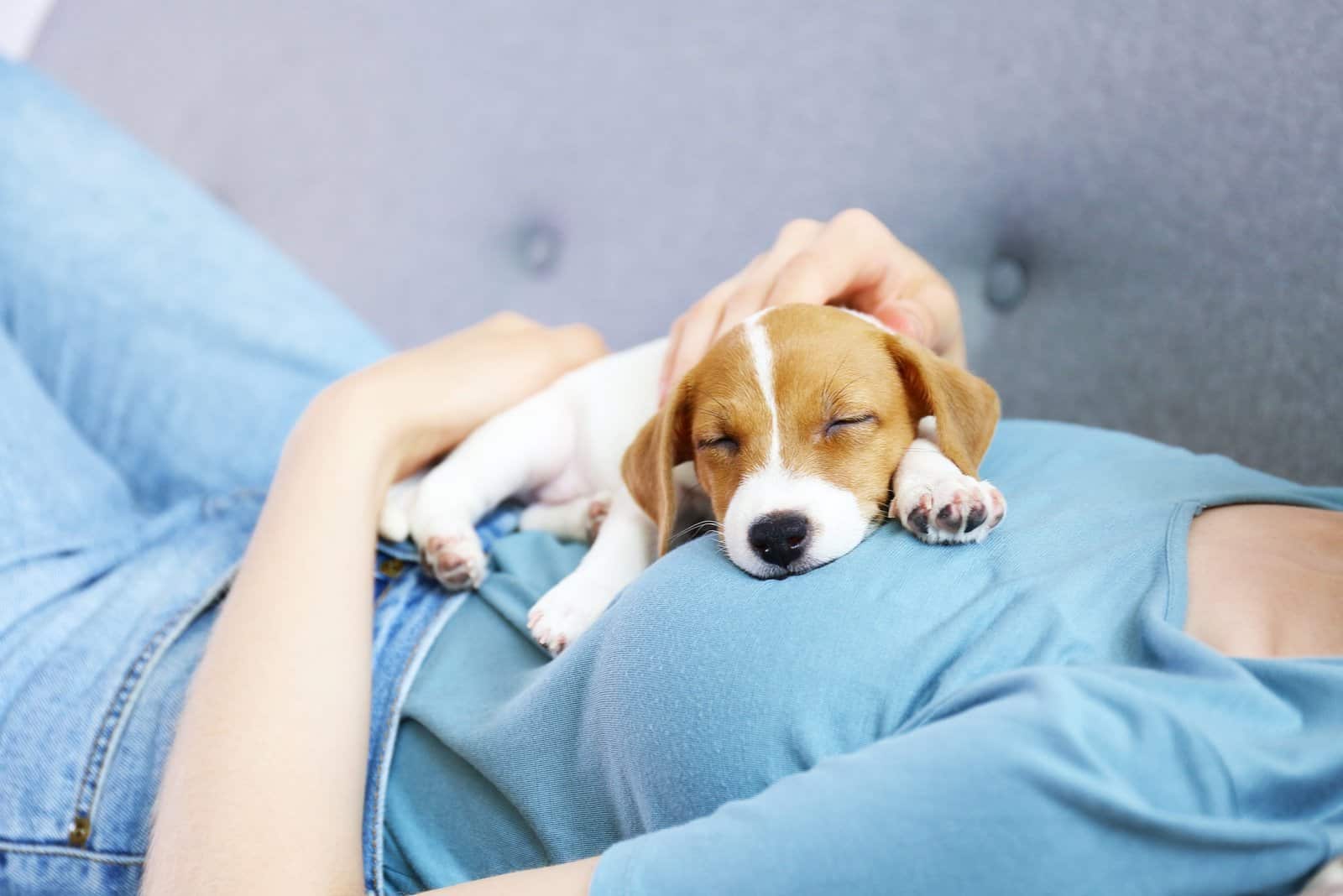
So, we have learned something about why an 8 week old puppy breathing fast while sleeping.
As you can see, in some cases, this occurrence is nothing serious and you should not be worried. However, this symptom might be indicating a hidden health problem in your dog.
So, what you should do in case you notice rapid breathing or heavy breathing in your puppy, is to look for other symptoms. If you notice other unusual behavior in your puppy, it’s best to ask for veterinarian’s help right away.
We can never be careful enough when it comes to puppies! Before they develop their immune system they are very fragile and need us to take good care of them.
Once puppyhood is over, you will be glad to know your dog is becoming one healthy and happy adult dog! So, take them to regular vet check-ups from the day they become your family member.
Finally, always pay attention to any changes you see in your dog. Some might be completely harmless, but others might indicate serious health conditions.
Related Content
• My Puppy Is Always Hungry – When To Stop Feeding
• Puppy Crying At Night In The Crate: Everything You Need To Know
• What Could Crusty Scabs Around Dog’s Mouth Mean? 9 Explanations
